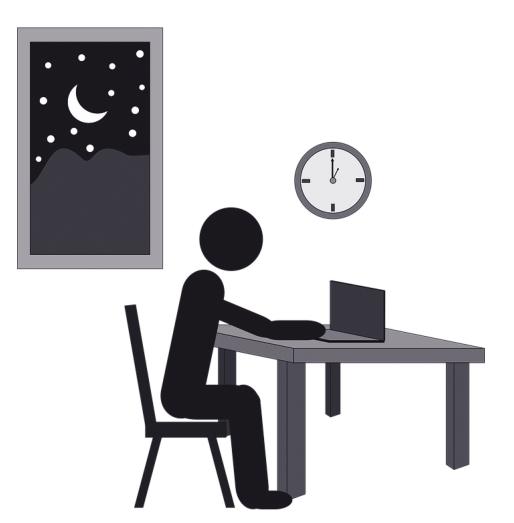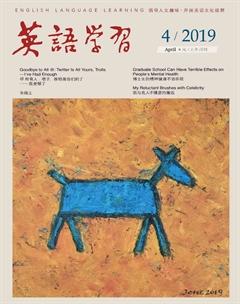博士生的精神健康不容乐观
By Alia Wong
“I was always gung ho1 about going to graduate school for some reason,” reflects Everet Rummel, a data analyst at the City University of New York. “That was naive.”
Rummel was indeed gung ho, embarking on a doctoral program in economics immediately after completing both his bachelors and masters degrees in just four years. He was only 22 years old. And Rummel was indeed naive, at least in his own telling of his plans. That plan—which for the average doctoral candidate takes roughly eight years—ended quickly, not because of Rummels characteristic efficiency but because he never completed it. “I dropped out,” he explains, attributing the decision to a lot of different factors, many of them not directly related to his studies, but each pointing back to the all-encompassing, unforgiving stress of his Ph.D. program.2
One major stressor3, he says, was the requirement that all firstyear Ph.D. economics students take the same three courses. But other major stressors are likely to resonate4 with graduate students in all kinds of disciplines. The doctoral-degree experience often consists of intense labor expectations for little pay and a resulting lack of sleep and social life.5 In addition, there is the notorious hierarchy of academia, which often promotes power struggles and tribalism.6

上學的时候,老师们常说:世界上没有比读书更容易的事情了。然而对那些正在攻读博士学位的人来说,读书,让他们丧失了休闲娱乐的时间,让他们在贫困线的边缘挣扎,让他们不断质疑自己对社会的意义,也让他们因此忍受着更大的精神压力。
To make matters worse, the payoff for all that stress may be wanting:7 A 2014 report found that nearly 40 percent of the doctoral students surveyed hadnt secured a job at the time of graduation. Whats more, roughly 13 percent of Ph.D. recipients graduate with more than $70,000 in education-related debt, though in the humanities the percentage is about twice that. And for those who do secure an academic post, census data suggest that close to a third of part-time university faculty—many of whom are graduate students—live near or below the poverty line.8
A new study by a team of Harvard-affiliated9 researchers highlights one of the consequences of these realities: Graduate students are disproportionately likely to struggle with mental-health issues. The researchers surveyed roughly 500 economics Ph.D. candidates at eight elite universities, and found that 18 percent of them experienced moderate or severe symptoms of depression and anxiety. Thats more than three times the national average, according to the study. Roughly one in 10 students in the Harvard survey also reported having suicidal thoughts on at least several days within the prior two weeks. (Other recent studies have had similar findings, including one published earlier this year that described graduatestudent mental health as a “crisis.”)

The studys results, which also include survey responses from nearly 200 faculty members, indicate that many Ph.D. students mental-health troubles are exacerbated10, if not caused, by their graduateeducation experiences. Roughly half of the respondents in the Harvard study with anxiety and/or depression had been diagnosed sometime after starting their graduate studies. And students toward the end of their programs were far more likely than those who were just embarking on their graduate journeys to report severe symptoms of anxiety or depression.
Graduate students cite the combination of financial and professional pressures as a significant challenge. Lucy Johnson, an assistant professor of digital literacies11 at the University of Wisconsin–Eau Claire, says that the financial burdens of her Ph.D. studies made it difficult for her to “escape the graduate curriculum”—by, say, seeing a movie or going out for dinner. Students who already feel isolated by their rigorous12 academic work are bound to feel even more isolated by their financial troubles, she suggests. Like many of her peers, Johnson eventually took out loans13 to support herself.
And then there is the academic pressure itself. Graduate education relies on “this idea that we have to produce, produce, produce, or do a lot more labor than others, so were worn quite thin,” says Johnson, noting that such labor is often promoted under the guise of14 “professionalization.” “I think its something were just supposed to accept as being part of the process.”
Similarly, Rummel—who had long daydreamed of becoming a professor, drawn to the promise of tenure and the prospect of conferences where he could discuss many topics ad nauseam with like-minded “nerds”—says that he and his peers were expected to treat their doctoral education as a “rite of passage.”15“To get that life, you have to pay your dues16—and then some,” says Rummel, whos now 25. “Its accepted that youre supposed to hate your life for a long time.” His school made some effort to ameliorate17 students stress—hosting events on self-care, for example, and offering free massages during finalexam weeks. “But no one,” he adds, “has time for that.”
Compounding18 the pressures is the sense, at least according to the economics Ph.D. candidates surveyed by the Harvard researchers, that their work isnt useful or beneficial to society. Only a quarter of the studys respondents reported feeling as if their work was useful always or most of the time, compared with 63 percent of the entire working-age population. Only a fifth of the respondents thought that they had opportunities to make a positive impact on their community.
Regardless, relatively few study participants reported receiving regular mental-health treatment—including just one in four of the respondents whod experienced suicidal thoughts. And perhaps most tellingly, the graduate students in the study who scored worse than average on a mental-health assessment tended to think that their mental health was better than average. Among those who reported that they recently had suicidal thoughts, 26 percent assumed that their psychological well-being was better than the norm. This dissonance hints at the ubiquity of the problem19—the widespread acceptance of poor mental health as a fact of life in graduate education.

1. gung ho: 起劲的,狂热的。
2.“我辍学了,”他解释道。他将这一决定归结为许多不同的因素,其中很多与学业并不直接相关,但都与博士项目中林林总总、难以摆脱的压力息息相关。allencompassing: 包罗万象的。
3. stressor: 导致紧张(焦虑)的事物。
4. resonate: 发出回响,产生共鸣。
5. 追求博士学位的过程通常工作繁重,而酬劳却微乎其微,随之而来的是睡眠不足和社交缺乏。
6. notorious: 臭名昭著的; hierarchy:等级制度,分级体系;academia:學术界;tribalism: 部落制度,此处指拉帮结派。
7. payoff: 结果,报偿;wanting:不令人满意的,不合要求的。
8. post: 职位,职务;census data:人口普查数据;poverty line:贫困线。
9. Harvard-affiliated: 隶属于哈佛大学的。
10. exacerbate: 使恶化,使加剧。
11. digital literacy: 数位素养,即运用电脑及网络资源来搜集、评估、整合数据信息的能力。
12. rigorous: 严格的,严厉的。
13. take out loans: 申请贷款。
14. under the guise of...: 在……的伪装之下。文中指这些繁重的工作是掩藏在“专业化”的伪装之下的。
15. 同样,在拉梅尔这样一心想当教授的人看来——他沉浸在获得终身教职的憧憬之中,想象着自己在会议上和书呆子同僚们令人可笑地探讨许多主题——博士阶段对于他和他的同事来说就是一个过渡仪式。tenure: 终身教职;ad nauseam: 讨厌地,令人可笑地;rite of passage: 一般指个体从一个群体中离开,进入另一个群体的仪式,比如成年礼、婚礼等。
16. pay ones dues:〈美俚〉经受苦难,取得经验。
17. ameliorate: 改善,减轻。
18. compound: 使恶化,使加重。
19. dissonance: 不和谐;ubiquity:无处不在,普遍存在。
阅读感评
∷秋叶 评
二十年前,我成为了一所著名大学的博士生。经过整整六年的寒窗苦读和导师的苛求与批评(我的专业就是文学批评,但对于施加在自己头上的过多的批评,回想起来还是有些灰心丧气),虽然勉强抵达了终点,可谓浴火重生,但攻读博士之路就像游子漂泊在外,急于要找回自我的归乡之路。这六年生涯,恰如费翔在《故乡的云》中所唱的,“踏着沉重的脚步,归乡路是那么的漫长/我已是满怀疲惫,眼里是酸楚的泪/我曾经豪情万丈,归来却空空的行囊!”我后来知道,读博经历成为人生永远之痛的,实在是不乏其例。与我同系同专业的一位学长,在读博期间罹患不治之症,完成论文并答辩通过后,人生也走到了终点。我还认识一位已届中年的女博士生,在原单位已晋身为教授职衔,但在读期间与导师不和,论文迟迟得不到实质性指导,无法提交答辩,后患上狂躁抑郁症,与导师沟通中数次采取极端手段,最终被开除学籍,遣返回家。
从原文里的调查数据来看,美国博士生的精神状况应该要更为严重。据称,在美国八所精英大学的约500名经济学博士生中,18%有焦虑与抑郁症状,是社会平均值的三倍以上。另外,在哈佛大学的博士生中,有十分之一的人在过去的半个月中有过自杀的想法,而且半数是在入学后才出现此精神健康危机的。美国博士生在此方面与中国相比有过之而无不及,显然与他们在学业与经济上所承受的更为沉重的负担有关。在学制上,我国博士培养期限一般为3—6年,而在美国要长达7—12年,同时,在各个环节的把关上,我们往往有着更多的人情照顾因素,而他们却更为严格,只认事不认人。这也就是为什么美国博士生真正毕业的不足入学数量的一半,而在我国这种情况则比较罕见。在中国,一位学生不间断地从小学入学直至博士毕业,通常要历经寒窗二十多载,风雨后见彩虹之时已近而立之年,而在美国,更是早已步入中年了。王国维提出做学问有三种境界,依次为:“昨夜西风凋碧树。独上高楼,望尽天涯路。”“衣带渐宽终不悔,为伊消得人憔悴。”“众里寻他千百度,蓦然回首,那人却在,灯火阑珊处。”前面两种境界,相信绝大部分的博士生们都经历了,但“蓦然回首”时,等待他们的却往往并不美妙。近几年来在中国,这些所谓“最强大脑”毕业生(super-smart graduates)要在高校与研究机构谋得体制内的教职与研究职位,难度已越来越大。即便谋得一个较为理想的职业,待遇也很有限,生活会相当清苦,在城市里要成立家庭、安居乐业实为不易,而他们的本科或硕士阶段的同学恐怕早已有房有车有家庭了,他们之间的差别就是“读还是不读博士”。“理想很丰满,现实很骨感”,这句前几年在我们社会上流行的话真是对他们的很好概括!而在美国,情况也好不到哪儿去,投入与产出更是倒挂严重。
在美国,大部分博士生靠奖学金,靠当助教或助研以及申请学生贷款来支付学费与生活费,甚至有的还需动用家庭、个人甚至配偶的存款。有调查发现,大约13%的美国博士生毕业时,其累积的助学贷款高达七万多美元,文科学生更是加倍。然而更糟的是,他们中的绝大部分人在毕业时债台高筑,却工作无着。一个2014年的调查显示,美国博士毕业生中无法找到固定职业的已占到40%左右。高期望与低现实之间的巨大反差,往往深深地刺痛了他们的内心,更让他们感觉无法向家人、配偶甚至多年苦读的自我有个完满的交代。有美国朋友告诉我,在这些年,你如果冒昧地问一位临近毕业的博士生是否找到了工作,得到的回应很有可能是其“骤然爆发的类似恐慌的症状(instant panic-like symptoms)”。在动物界,达尔文已概括出“survival of the fittest(适者生存)”的丛林法则,但愿在高度文明的人类学术界,为求生存与发展,不至于如此残酷!
——王永平教授
——陈桂蓉教授
——基于不同层次高校教师的实证研究
——拜根兴教授

